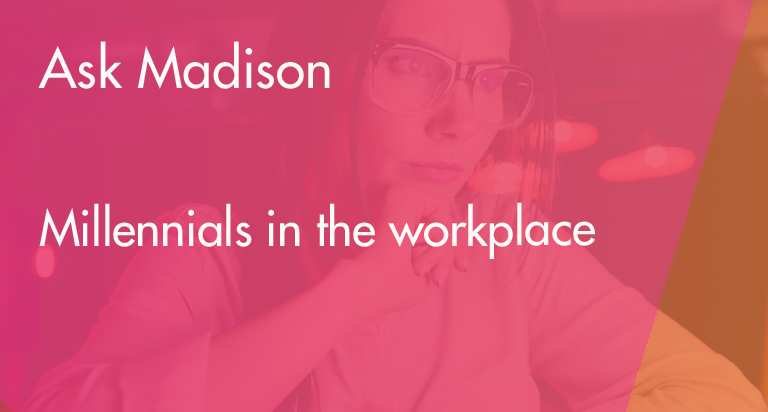As the economy continues to ebb and flow, Gen Zers graduate from college, and Baby Boomers keep pushing off retirement, we’re seeing something new: a multi-generational workforce that includes four generations. While a mixed-gen workplace is nothing new, having four different generations at one time in the workplace is a historical first.
While it has provided unique perspectives and life experiences, it has also forced businesses—more specifically leaders—to rethink a one-size-fits-all approach to managing employees.
Millennials, Baby Boomers, Gen X, and Gen Z all have different preferences that require a nuanced approach. In this three-part blog series, we’re breaking down how to work more effectively with each generation. Up next? Millennials.
Who are Millennials?
Millennials (aka Gen Y) were born sometime between the early 80s and late 90s, and, as the name implies, many in this generation came to age at the turn of the millennium. In the United States, they make up the largest generation, with over 80 million people. They’re often the children of Boomers, falling in between the Gen X and Z generations.
Millennials share a few common traits:
- They’re job hoppers. It has become somewhat of a joke, but the term Millennial has become almost synonymous with job hopping and a grass is greener mentality.
- Millennials are smart. Did you know Millennials are the most educated generation of all time? A majority have earned their bachelor’s degree or higher.
- They are survivors. Millennials have overcome recessions, catastrophic world events, crippling student loan debt, and low salaries post-graduation.
Millennials in the workplace
Millennials seem to be a mashup generation in the workplace—they value a healthy work-life balance like Gen X and they’re on par with Gen Z with technology use. But there are small nuances that define Millennials, namely their comfort with job hopping and their commitment to values.
Let’s look at some other characteristics of Millennials in the workplace.
- They believe that you have to go somewhere else to get a promotion or pay raise—and they’re willing to leave their organization to get it
- Though not digital natives, many Millennials grew up with technology and are on par with Gen Z in their tech prowess
- Because of previous traumas—like the financial impacts of September 11 and multiple recessions—Millennials are driven by financial gains (which is another reason for their job hopping)
- Millennials love learning and will seek professional and development opportunities to grow their skills
- They’re credited as being the generation responsible for driving more equitable and inclusive workplaces, so corporate values and responsibility are a top priority
- Flexibility, whether it’s creating their own schedules or working remote, is a non-negotiable for Millennials
Millennials communication preferences
Many Millennials grew up during the dot-com boom, which has shaped their preference for communication using technology, like texts, Slack messages, and comments in project management tools. But they’re also open to more traditional ways of communication, like phone calls and emails.
- Millennials value open and authentic communication over a formal or overly professional style
- They’re more comfortable with casual conversation—emojis, jokes, and using more casual tools (like social media or messaging apps) isn’t uncommon
Motivating Millennials
Millennials may be more financially driven than other generations, but that doesn’t mean the only path to motivation is a pay raise or financial gain. Other ways you can incentivize your Millennial colleagues include:
- Giving them the flexibility to create the work-life balance they crave—this could be allowing them to work remotely or work non-traditional hours
- Offer professional and personal development opportunities, like paying to send them to conferences or offering tuition reimbursement
- Establish a clear path to promotion, offer bonuses, or give incremental pay increases so Millennials know they can advance their careers at your company instead of feeling like they’re in a dead-end job
Moving forward
Millennials bring a lot to the workplace—especially as the most educated generation in history. But they have unique wants, needs, and ways of working that, if you don’t meet, could cost you a stellar employee.
It’s your responsibility to manage and reward them in a way that retains them for the long term. These tips are a good start, but if you want to learn more, download our ebook. And if you still need help, get in touch—we’ll be happy to help.
At Madison Recognition our work is rooted in the belief that unleashing the productive potential of employees with reward and recognition programs and empowering individuals will help us stay ahead of workforce trends. Want to learn more about working with Gen Z? Download our white paper.



